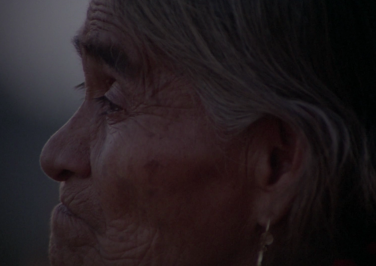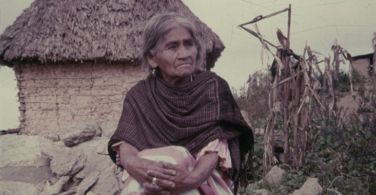

María Sabina. Mujer Espíritu, Nicolás Echevarria, Mexico, 1979, 81'
María Sabina, Mujer Espíritu (María Sabina, Spirit Woman) is an ethnographic documentary that tells the tale of one of the many female curanderas (healers) - guardians of life and of the land - that treated their patients with medicinal plants and plants of power in Abya Yala. Teonanacatls – or, as Sabina calls them, “the little boys” – are known in the West as psilocybin mushrooms, or ‘magic mushrooms’. While the recreational use of these mushrooms is prohibited in many parts of the world, evidence of their consumption can be found in stone engravings in North African Saharan populations that date as far back as 9000 BC. They have also been depicted in 6000-year-old cave paintings uncovered in Villar del Humo (Cuenca, Spain), which suggests that the Psilocybe Hispanica mushroom was consumed during religious rituals close to this town.
The wisdom of mushrooms is not, therefore, something isolated or fortuitous. Rather, they were deeply rooted in Mesoamerican tradition by the Mayan, Mixtec and Mexica civilisations. Maria Sabina was visited by many people from all over the world. These patients wanted to heal their physical body by receiving treatment for their mental body and emotional body, which, according to this tradition, are what ultimately produce illnesses. Maria Sabina is able to communicate with the hills and the guardians of the springs, which talk in their own language. From a very young age, she knew how to harness these natural forces to heal others. However, her job as a curandera was limited by the fact that she was a woman. Sabina continued to watch and experience the visions that these principal beings offered her, which she used to heal her family, her clan, her community and everyone who came to visit her.
This film is presented to shine a light on the words, voices and songs of a character who is a creator of her own experience, revealing the individual tales that inhabit the stories in the most direct way possible. Despite being produced by a non-indigenous filmmaker, Maria Sabina, Mujer Espíritu has the sensitivity and humility required to transmit the importance of what happens in the Mazatec land, representing a new way of understanding the sacred medicine of mushrooms.
Nicolás Echevarría introduces us to the Sierra Mazateca through the use of various long shots, where we discover a universe that is inhabited by energetic beings. The film then follows María Sabina in her day-to-day life, generating an intimacy by revealing her daily routine and her solitude, wisdom and generosity.
Could María Sabina, Mujer Espíritu be classed as indigenous film? What are its characteristics? Can indigenous films only be made by indigenous filmmakers? Is it necessary, therefore, to ask ourselves about the labels of creation and the authority assigned to what is cinematographic? Must we also ask ourselves how ethnographic cinema has created imaginations, stereotypes and romanticised visions based on the folklore and exoticism of non-Western peoples, and how urgent it is to decolonise this perspective in order to question how the hegemonic centres have determined what, how and where cinematic aesthetics are constructed?
*
Mexican filmmaker Nicolás Echevarría has produced several of the most important ethnographic films produced in Mexico, such as: Judea (1973), María Sabina, Mujer Espíritu (1978), Teshuinada (1979), Poetas Campesinos (1980) and Niño Fidencio (1980). His fictional film Cabeza de Vaca (1991) was selected by the Mexican Academy of Film Arts and Sciences to represent Mexico in the .Oscars This work won the ‘Makila de Oro’ at the Biarritz Film Festival (France) and was amongst the official selections for the Berlin International Film Festival in 1991.
Curated by Amaranta Díaz, Oderay Ponce de León Bello and Valery Rojas.
